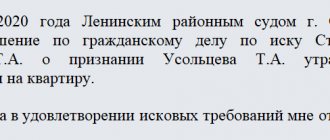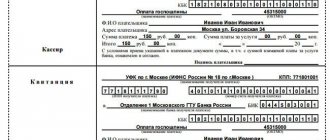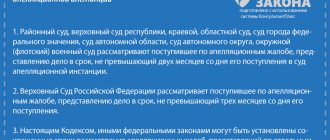The term short appeal in a civil case is not legally defined. This does not prevent practicing lawyers from using such a tool. And it does not cause misunderstanding on the part of judges. When a short appeal is filed, why and how it differs from a full appeal – this will be discussed below.
Chapter 39 of the Civil Procedure Code of the Russian Federation is devoted to issues of appeal against decisions of courts of first instance. The applicant must draw up a brief complaint carefully. After all, the purpose of filing a document is to suspend the entry into force of the decision of the first instance court and begin proceedings in the appellate court. Such a document will give time to prepare a reasoned (i.e. in full) appeal. Therefore, a short complaint is often called a preliminary complaint.
An example of a short appeal will allow you to compose your document according to the proposed template.
:
Brief appeal in a civil case
What is a short appeal?
The need to file a short or preliminary appeal arises due to the following conflict. The period for filing an appeal begins from the moment of announcement, and not from the moment the interested party receives a reasoned decision.
According to the law, persons who are present in the courtroom when the verdict or ruling is announced are not sent a full copy of the ruling. The court announces the effective part and has a legal 5 days to prepare a reasoned conclusion of the meeting.
In addition, in practice, in 60% of cases the court office does not have time to draw up a copy of a reasoned decision within the required five days. Thus, the opportunity for the parties to the process to draw up and file a full appeal within the time limits provided by law is closed.
Therefore, interested parties file a brief complaint with the higher court; after reading the full text of the district court’s conclusion, an addition or a full-fledged appeal is filed.
Underwater rocks
When preparing a short complaint, you should remember some subtleties:
- Submission deadlines. If you do not submit the document on time, the appeal procedure becomes impossible.
- Content. The court may leave the document without movement if the content does not comply with the requirements of the Code of Civil Procedure of the Russian Federation.
- Documentation. The application must be accompanied by supporting documents that will allow the court to make the right decision. A list of them is given in the text, and they are presented in the form of appendices.
How to write a short complaint
A brief appeal in a civil case actually starts the process of overturning the district court's decision, so the document is drawn up according to the established template. After receiving it, the court begins a new trial.
READ Filing an appeal against the decision of the court of first instance
Since the preliminary text of the direction is legally considered complete, the paper is drawn up taking into account the requirements of Art. 322 of the Code of Civil Procedure of the Russian Federation, the document indicates:
- The full name of the higher court that will hear the case.
- Applicant details (full name, registration, status in process).
- Details of the contested decision (date of consideration, name of the court, decision number).
- A short description of what the applicant disagrees with in the judge's findings.
- A summary paragraph with a demand to cancel (tighten, soften) the decision.
- Date of document preparation, signature.
Code of Civil Procedure of the Russian Federation Art. 330 provides a complete list of grounds for overturning a court decision and filing an appeal; if the applicant draws up the document independently, it is recommended to use the provision of law. Filing a short challenge allows you to fully prepare for the process.
An appeal in a criminal case must be submitted to a higher court within 10 days.
An appeal against a district court decision in an administrative case to the courts of general jurisdiction or an arbitration court, within 30 days.
The Supreme Court will explain the application of civil procedure rules in appellate courts
On April 6, the Plenum of the Supreme Court sent for revision a draft resolution on the application by courts of the norms of civil procedural legislation governing proceedings in the appellate court.
Lawyer of the AP of the Republic of Dagestan KA "Yustina" Kamil Babasov noted that this kind of resolution of the Plenum of the Supreme Court can only be welcomed, since due to the detailed regulation of procedural actions that cannot be reflected in the law, they lead to uniform practice in courts of all instances.
What is subject to appeal and who can appeal?
The Supreme Court indicated that the possibility of appealing court orders of the Code of Civil Procedure is not provided for. A court order may be appealed to cassation in the manner, within the time limit and on the grounds provided for in Chapter 41 Code of Civil Procedure.
It is noted that judicial decisions of courts of appeal, as well as judges of these courts, adopted either individually or collectively, enter into legal force from the moment of their adoption and are not subject to appeal. These court decisions can only be appealed to a cassation court.
Clause 3 states that if an appeal or presentation is filed not against a court decision as a whole, but only against a part of it or an additional decision, then in this case the appealed decision does not enter into legal force
According to paragraph 6, the right to appeal court decisions also belongs to the legal successors of the persons participating in the case, and to persons who were not involved in the case, but whose rights and obligations are resolved by the appealed court decision. In this case, succession can be either complete or partial (for example, when assigning part of the claims).
Persons acting as representatives in court, when filing an appeal, with the exception of complaints against decisions of magistrates and district courts, must provide the court with copies of documents on higher legal education or an academic degree in a legal specialty or documents certifying the status of a lawyer (Part 2 and 3 Article 49 of the Code of Civil Procedure), if there are no copies of such documents in the file. These requirements do not apply to patent attorneys in disputes related to the legal protection of the results of intellectual activity and means of individualization, arbitration managers in the performance of duties assigned to them in a bankruptcy case, trade unions, their organizations, associations representing in court the interests of persons who are members trade unions, on disputes related to the violation or challenge of rights, freedoms and legitimate interests in the field of labor (service) relations and other directly related to them, as well as other persons specified in federal law.
The Supreme Court noted that in cases in which the prosecutor's office and their officials are a party to controversial legal relations, they have all the procedural rights of the relevant party to the process (plaintiff or defendant), including the right of appeal. Provisions of Art. 45 of the Civil Procedure Code do not apply in this case.
The Supreme Court indicated in the draft that persons who have the right to appeal to protect the rights of another person can file an appeal even if they did not participate in the consideration of the case by the court of first instance, for example, if the claim was brought by the person in whose interests the filing was made appeal.
The Supreme Court also noted that state bodies and local government bodies have the right to file an appeal, regardless of whether they were involved in the case by the court of first instance and whether their representatives participated in the first instance, if their participation in the case is provided for by federal law.
Valid reasons for missing the appeal deadline
The draft notes that filing an appeal or presentation directly to the appeal does not constitute grounds for their return to the applicant. Based on the provisions of Part 1 of Art. 321 of the Code of Civil Procedure, the court of appeal independently sends them to the court that made the decision to carry out the actions provided for in Art. 325 Code of Civil Procedure.
Clause 16 states that the one-month period for filing an appeal or presentation begins from the day the court makes a decision, and if only the operative part of the decision was announced at the court hearing, from the day a reasoned decision is drawn up, and ends on the corresponding date of the next month. For example, if a reasoned decision was drawn up on July 31, then the last day for filing an appeal or presentation is August 31 (up to 24 hours).
If there is no corresponding date in the next month, the deadline expires on the last day of this month (for example, if a reasoned decision was made on March 31, then the last day of the deadline is April 30), and if the last day of the deadline falls on a weekend (Saturday or Sunday) or a non-working holiday, the end of the period is considered to be the first working day following it (parts 1 and 2 of article 108 of the Code of Civil Procedure, articles 111 and 112 of the Labor Code). In cases where the period for an appeal is calculated in days, it does not include weekends and non-working holidays (Part 3 of Article 107 of the Civil Procedure Code, Articles 111 and 112 of the Labor Code), unless otherwise established by the Code of Civil Procedure.
In paragraph 17, the Supreme Court recalled that the period for appealing decisions of magistrates, which is one month, as well as the period for appealing decisions in cases considered through summary proceedings, which is fifteen days, is calculated from the date of adoption of these decisions, and in the case drawing up a reasoned decision at the request of persons entitled to do so - from the date of drawing up the reasoned decision.
The Supreme Court also clarified that the one-month period for appealing a decision in absentia begins from the day the ruling was issued to refuse the application to cancel the decision in absentia (Part 2 of Article 237 of the Code of Civil Procedure). If such an application has not been filed by the defendant, an appeal or a submission against a decision in absentia may be filed within a month from the expiration of the seven-day period established for the defendant to file an application to cancel the decision in absentia. The seven-day period begins to run the next day after delivery to the defendant of a copy of the default judgment or its delivery to the defendant’s last known place of residence, which is confirmed by the corresponding postal notification.
In paragraph 21, the Supreme Court noted that the court of first instance, on the basis of Art. 112 of the Code of Civil Procedure restores the deadline for filing an appeal or presentation if it recognizes the reasons for missing it as valid. Valid reasons may include objective circumstances that prevent the applicant from performing the relevant procedural actions (for example, emergencies and incidents: floods, fires, earthquakes, epidemics, etc.). In relation to citizens, valid reasons may also include circumstances related to the personality of the applicant (serious illness, helpless condition, etc.), family circumstances (death or serious illness of family members and close relatives, other situations requiring the personal participation of the applicant) , as well as other circumstances, if they excluded or significantly complicated the filing of an appeal within the time limits established by law.
Valid reasons for missing the deadline for an appeal may also include: failure by the court to involve the appellant in the case; receipt by a person who was not notified of the court session in which the hearing of the case ended, and was not present at it, of a copy of the court decision after the expiration of the appeal period or when the time remaining before the expiration of this period is clearly not enough to become familiar with the case materials and draw up a reasoned appeal , representation. In addition, a valid reason is the failure of the court of first instance to explain the procedure and deadline for appeal, failure to comply with the established Art. 214 of the Code of Civil Procedure of the period for issuing or sending a copy of the court decision to persons participating in the case, posting it on the official website of the court in a restricted access mode, violation of the right of persons participating in the case and their representatives to familiarize themselves with the case materials, make extracts from them and make copies, if such violations have led to the impossibility of preparing and filing motivated appeals or submissions within the time limit established for this.
The Supreme Court noted that when deciding on the restoration of the period for appeal, the courts of first instance should take into account the timeliness of filing a complaint or presentation based on the moment when the obstacles to their preparation and filing no longer exist. In particular, for persons not involved in the case - from the moment when they learned or should have learned about the violation of their rights and (or) the imposition of obligations on them by the appealed court decision.
“Circumstances such as the presence of a representative of the organization on a business trip or vacation, a change in the head of the organization or his presence on a business trip or vacation, the absence of a lawyer on the staff of the organization, a reference to the lack of funds for payment cannot be considered as valid reasons for a legal entity to miss the deadline for an appeal. assistance of a representative or payment of a state fee, untimely execution of a power of attorney by a higher organization, etc.,” the Supreme Court indicated.
Partner of the law firm "KRP" Viktor Glushakov noted that now at the level of the resolution of the Plenum of the Supreme Court such valid reasons as violation of the deadline for issuing (expulsion) of the decision, as well as procedural violations that did not allow the party to familiarize themselves with the case will be fixed. “The limitation “if such violations have led to the impossibility of preparing and filing motivated appeals…” is a little confusing. That is, the position seems to be correct, but at the same time the court has the opportunity to discredit the validity of the reason for missing the deadline and do this based solely on judicial discretion,” the lawyer said.
The draft notes that the presence in the first instance ruling on the restoration of the term of an indication that the appealed court decision resolved the issue of the rights and obligations of a person not involved in the case cannot predetermine the result of the appeal consideration of the case. This fact as an unconditional basis for overturning a court decision must be established by the court of appeal.
In paragraph 24, the Supreme Court noted that if a person is exempt from paying court costs, then he cannot be charged with sending or delivering to other persons copies of the appeal, presentation and documents attached to them. In this case, the documents are sent to the court of first instance. It is also noted that the court, at the request of the person who filed the appeal, taking into account specific circumstances that prevent the applicant from sending copies of documents (for example, if the applicant is disabled, retired, unemployed, a citizen affected by an emergency), has the right to relieve him of this obligation . In this case, the court of first instance itself sends documents to the persons participating in the case.
The draft resolution states that the deadline for correcting shortcomings in an appeal or presentation to the court of first instance should be set taking into account the real possibility of their elimination by the applicant, as well as the time required for sending and delivering postal correspondence, based on the territorial distance from the court of the applicant’s place of residence or location or other circumstances. At the request of the applicant, the court of first instance, on the basis of Art. 111 of the Code of Civil Procedure may extend the period for correcting deficiencies.
In paragraph 28, the Supreme Court considered that shortcomings and errors in their execution that do not prevent their consideration in the appellate court (for example, grammatical and technical errors and typos) cannot be grounds for leaving appeals without progress. A private complaint may be filed against the judge’s decision to leave the appeal or presentation without progress, bringing the prosecutor’s presentation in the manner and within the time limits established by Chapter. 39 Code of Civil Procedure. When resolving the issue of returning an appeal or presentation on the basis provided for in paragraph 1 of Part 1 of Art. 324 of the Code of Civil Procedure, it is necessary to take into account the time required to deliver to the court the documents submitted by the applicant to the post office.
Actions of the appellate court after the receipt of the case
The draft explains that a decision to suspend the execution of judicial acts or to refuse to suspend is made by a judge alone without holding a meeting during the preparation of the case or at a court hearing within three days from the date of receipt of the petition. If this happened before the case was received from the first instance, the period for consideration of the petition is calculated from the moment the case (material) is received by the appellate court (part 4 of article 1, part 1 of article 327.2 of the Code of Civil Procedure).
The Supreme Court indicated that all appeals and submissions filed against one court decision must be scheduled for consideration and considered in one court session. If there is information about the receipt of other appeals, presentations at the first instance, or when they are received directly by the appellate court, the case is subject to return to the first instance to carry out procedural actions provided for in Art. 323, 324, 325 Code of Civil Procedure. If a previously received appeal or presentation has not yet been accepted for court proceedings, the case is returned with a covering letter, and after they are accepted for consideration - by a judge’s ruling or a ruling of the appellate court issued at a court hearing, of which the persons participating in the case are notified.
In order to comply with reasonable deadlines for legal proceedings, an appeal upon receipt by the court of appeal after accepting a complaint, presentation of other complaints, presentations has the right not to send the case to the first instance if it establishes that the newly received complaint, presentation was filed in accordance with the established Art. 321 Civil Procedure Code deadline and comply with the requirements of Art. 322 Code of Civil Procedure. In this case, the actions provided for in Part 1 of Art. 325 of the Code of Civil Procedure are carried out by the court of appeal.
Consideration of a case on appeal: procedure, terms, limits
According to clause 38 of the draft, within the meaning of Art. 327 of the Code of Civil Procedure, re-examination of the case in the court of appeal involves verification and assessment of the factual circumstances and their legal qualification within the limits of the arguments of the appeal, presentation and within the framework of those requirements that have already been the subject of consideration in the first instance. New substantive legal requirements in accordance with Part 4 of Art. 327.1 of the Code of Civil Procedure are not accepted or considered. Exceptions are requirements that the first instance, by force of law, had to resolve, regardless of whether they were stated or not, for example, for the collection of child support in cases of deprivation and restriction of parental rights or for the collection of a fine for failure to comply with the voluntary procedure for satisfying consumer requirements .
The Supreme Court noted that within the meaning of Part 1 of Art. 327 of the Code of Civil Procedure, when reconsidering a case by an appellate court, the rules on letters rogatory, on court costs, on notices and summonses, on securing a claim, on preparing a case for trial, measures for reconciliation of the parties, and the use of video conferencing systems are applied. communications, rules for resolving motions of persons participating in the case, rules for postponing trial. Also within the meaning of this provision, the rules for the study and evaluation of evidence, the rules for announcing a court decision, the adoption of a court decision, the drawing up of a reasoned court decision, the rules for suspending proceedings in a case and terminating proceedings in a case, the rules for leaving an application without consideration are applied.
By virtue of Part 6 of Art. 327 of the Code of Civil Procedure in an appeal, the rules on joining and severing claims, changing the subject or basis of the claim and the amount of claims, filing a counterclaim, replacing an improper defendant and involving a co-defendant and third parties in the case are not applied.
It is emphasized that in the court of appeal, when considering the case, both taking into account the features provided for in Chapter. 39 of the Code of Civil Procedure, and without taking them into account, the consequences of failure to appear at the court hearing of persons participating in the case, provided for in paragraph. 7 and 8 art. 222 Civil Procedure Code
Paragraph 42 of the draft states that, based on the need to respect the right to judicial protection guaranteed by the Constitution, the court cannot refuse to accept additions to the appeal or presentation containing new arguments (judgments), as well as additions containing requirements different from the requirements , previously set out in the complaint or presentation (for example, a previously unappealed part of a court decision is being appealed). When accepting such additions to the appeal, it is necessary to discuss the possibility of considering the case at this court hearing or its postponement.
Viktor Glushakov drew attention to the issue of “additions” to the appeal. The draft resolution notes that the court is obliged to accept and consider such additions if they relate to the claim stated in the complaint: “This is especially true in situations where the principal requests to strengthen the position in the appeal. The court has no right to refuse to accept such an enhancement. It’s interesting to try to apply this by analogy to the arbitration process, where courts sometimes refuse to accept additions to the appeal.”
The appellate court may recognize the reasons for the impossibility of presenting new evidence at the first instance as valid. Such reasons include, in particular, the unjustified rejection by the first instance of petitions of persons participating in the case for discovery, for inclusion in the case, for the examination of additional (new) written evidence or petitions for calling witnesses, for ordering an examination, for sending an order; adoption by the court of a decision to refuse to satisfy a claim (application) due to missing the statute of limitations or missing the deadline established by federal law for filing a lawsuit without examining other factual circumstances of the case.
The obligation to prove the existence of circumstances that prevented the person citing additional evidence from presenting it to the court of first instance rests with that person. New evidence cannot be accepted by the appellate court if it is established that the person relying on it did not present this evidence to the trial court because he behaved in bad faith or abused his procedural rights.
According to Viktor Glushakov, this clarification is useful. “This list does not bring anything new to practice, but the very fact of its consolidation at the level of the resolution of the Plenum of the Supreme Court will have a positive impact on the uniformity of the courts’ approach,” he considered.
The lawyer also drew attention to clause 44 of the draft, which regulates the possibility of providing new evidence at the initiative of the court. “Situations when the appellate court, on its own initiative, begins to ask the parties to present new evidence are extremely popular for appeals in general jurisdiction, when the appellate court, on its own initiative, requests some evidence that was not previously in the case, and attaches it without taking into account neither issues of respect nor the opinion of the other side of the dispute,” said Viktor Glushakov. He explained that clause 44 allows for the addition of new evidence at the initiative of the court only if the first instance incorrectly determined the circumstances that are important for the case. “That is, judicial discretion and the desire of the court to see something new in the case are not enough,” the lawyer emphasized.
In paragraph 47, the Supreme Court indicated that in accordance with parts 1, 2 of Art. 327.1 of the Code of Civil Procedure, the appellate court checks the legality and validity of the court decision only in the appealed part, based on the arguments set out in the complaint, presentation and objections regarding them. At the same time, based on para. 2 hours 2 tbsp. 327.1 of the Code of Civil Procedure, the court has the right, in the interests of legality, to verify the appealed court decision in full.
In the interests of legality, taking into account the provisions of Art. 2 of the Code of Civil Procedure, one should understand the need to verify the correct application of the rules of substantive and procedural law by the first instance in order to protect the violated or contested rights, freedoms and legitimate interests of participants in civil, labor (official) and other legal relations, as well as in order to protect the family, motherhood, paternity, childhood . In addition, the interests of legality mean verification of the correct application of norms for the purposes of social protection; ensuring the right to housing; health protection; ensuring the right to a favorable environment; protection of the right to education and other human and civil rights and freedoms; in order to protect the rights and legitimate interests of an indefinite number of persons and public interests and in other cases of the need to protect law and order.
As stated in the draft resolution, appellate courts must take into account that the interests of legality are not met, in particular, by the application by the first instance of the rules of substantive and procedural law in violation of the rules of operation of laws in time, space and among persons.
In addition, the appeal must verify the court's decision in its entirety if the appealed part of the decision is inextricably linked with others. For example, if a court decision on the merits of a dispute is changed, the appeal must change the distribution of legal costs, even if the court decision in this part or a separate court decision on the distribution of legal costs has not been appealed. If a court decision is canceled in terms of declaring the will invalid and a new decision is made, the appellate court must change the decision in terms of determining the shares between other heirs, even if the decision in this part has not been appealed, etc.
At the same time, the Supreme Court noted, based on the adversarial principle of the parties (Article 12 of the Code of Civil Procedure), appealing a decision in terms of derivative claims, for example, in terms of collecting a penalty, fine, etc., is not in itself a basis for canceling or changing the decision court in the unappealed part.
“Since an additional decision is an integral part of the court decision and cannot exist separately from it, by canceling the court decision, the appellate court also has the right to cancel the additional decision - regardless of whether it was appealed or not. At the same time, the cancellation or change of an additional decision does not in itself entail the cancellation or change of the main court decision, if the latter has not been appealed,” the document states.
If the appeal has come to the conclusion that it is necessary to verify the decision of the first instance in full, the determination in accordance with paragraph 6 of Part 2 of Art. 329 of the Code of Civil Procedure must contain the reasons of the appellate court.
Consideration of the case by the court of appeal according to the rules of first instance
Paragraph 51 notes that if the appellate court recognizes the case as prepared based on the completeness and sufficiency of the collected evidence confirming the circumstances relevant to the case, as well as taking into account the opinions of those present at the hearing and participating in the case, about the possibility of continuing the consideration of the case in the same court session, he has the right to consider the case according to the rules of proceedings in the court of first instance, without taking into account the features provided for in Chapter. 39 Code of Civil Procedure. If it is necessary to carry out separate preparatory actions, the appeal in the ruling on moving to consideration of the case according to the rules of the first instance or in a separate ruling on preparing the case for trial indicates what actions should be taken and within what time frame.
According to paragraph 59 of the draft, a decision of the court of first instance, which is essentially correct, cannot be canceled for formal reasons alone, for example, due to violation of the order of debate by the first instance, unjustified exemption of a person participating in the case from paying state fees, etc. The nature of the violations committed by the court of first instance, as well as the question of whether they could have led to an incorrect resolution of the dispute, is assessed by the appellate court in each specific case based on the factual circumstances of the case and the content of the arguments of the appeal or presentation.
Result of consideration of appeals and submissions
The Supreme Court indicated that if, after the appeal ruling, new appeals or submissions are received from other persons against the decision of the first instance or part of it, which were left unchanged by the appeal, then the appellate court, on the basis of Art. 330.1 of the Code of Civil Procedure accepts them for its proceedings and considers them in the manner prescribed by Chapter. 39 Code of Civil Procedure. In this case, the case can be considered either in the same or in a different composition of the court.
If, when considering newly received appeals or presentations, the court comes to the conclusion that the decision of the first instance is illegal and unfounded in the part in which it was left unchanged, then it is canceled or modified, and the previously issued ruling in this part is canceled and a new one is adopted. If there are no grounds for canceling or changing the decision of the first instance, the appeal refuses to satisfy the newly received complaints or submissions.
According to paragraph 68 of the draft, rulings of the court of first instance, the possibility of appealing which is specifically provided for by the Civil Procedure Code, as well as rulings that exclude the possibility of further progress of the case, can be appealed to the appellate court. Determinations that exclude the possibility of further progress of the case include, in particular, a determination to refuse to accept an application for a court order, a determination to terminate proceedings in the case, a determination to leave the application without consideration.
Determinations, the appeal of which is not specifically provided for by the Civil Procedure Code in certain rules and which do not exclude the possibility of further progress of the case, based on the provisions of Part 3 of Art. 331 of the Code of Civil Procedure cannot be appealed separately from the decision of the court of first instance. Such determinations include, in particular, determinations on the acceptance of a statement of claim (statement) for the proceedings of the court of first instance, on the preparation of the case for trial, on the request of evidence, on the consolidation of cases into one proceeding, on the separation of the claim into a separate proceeding, on the postponement of the trial proceedings to leave the statement of claim without progress. Objections to the above rulings of the court of first instance can be included, respectively, in an appeal or private complaint or presentation (for example, arguments about the illegal abandonment of a statement of claim without progress can be included in a private complaint against a ruling on the return of a statement of claim).
Resolution of other issues
It is stated that in the event of an appeal changing the decision of the first instance, as well as in the event of its cancellation and the adoption of a new court decision, the appellate court changes or cancels the decision of the first instance on the distribution of legal costs, including if this is made by a separate decision of the court of first instance.
If the appellate court did not change the distribution of legal costs, then in accordance with Part 1 of Art. 103.1 of the Code of Civil Procedure, this issue is resolved by the court of first instance upon the application of the interested person, which can be filed with the court that considered the case as the court of first instance, within three months from the date of the appeal ruling. This period may be restored by the court of first instance if it is missed for valid reasons.
The lawyer advocated reducing the workload on judges to improve the quality of justice
Kamil Babasov pointed out that the Plenum of the Supreme Court did not resolve the main complaint of the legal community regarding the proceedings in the appellate instance - the formality of the appeal consideration. “The vast majority of cases in the appellate instance are carried out in 15–20 minutes, during which the reporting judge quickly outlines the essence of the dispute and complaint and invites the parties, without repeating the content of the complaint or objections to it, to speak out on the subject of the complaint. The study of the case materials, if it comes to this, consists of a cursory listing by the presiding officer of the names of the documents in the case, after which there is a debate and a decision. At the same time, the court in every possible way prevents the inclusion of additional materials or the consideration of the case according to the rules of the first instance, although formally, in accordance with Part 2, Clause 1, Art. 327 of the Code of Civil Procedure, the court re-considers the case in court according to the rules of proceedings in the first instance, taking into account the features provided for in this chapter,” the lawyer noted.
Kamil Babasov believed that this is probably happening due to the workload of the courts and the distrust of citizens in the decisions of the courts of first instance and in the institutions of the state as a whole. In addition, the costs of an appeal are quite small. In his opinion, the Supreme Court chose an extensive development path, creating new courts - appellate and cassation districts - and absolute the right to judicial protection.
“At the same time, an intensive path of development is also possible, in which a few simple measures will relieve the workload of the courts and enable the courts to consider cases in detail, without haste. For example, government authorities should prohibit a “complete” appeal, which actually exists in cases where authorities refused to satisfy claims or when something was recovered from them. This method of “fighting corruption,” which does not even allow an official to take the issue of appealing the decision of the court of first instance, leads to distrust of the decisions of the courts of first instance both in the authorities and other participants in civil proceedings. Another possible mechanism is a lawyer’s monopoly on representation in the courts of appeal and a multiple increase in legal costs in the form of state fees and court costs in the event of a refusal to satisfy an appeal,” Kamil Babasov pointed out.
Where to file a short appeal
A preliminary appeal against a court decision is filed with the same authority that issued the contested decision. Attached to the document is a copy of the receipt for payment of the state fee and a notice that copies of the appeal have been sent to all participants in the process.
When submitting amendments to a higher authority, copies of documents are transferred to all interested parties. The supplement is accompanied by postal notices or receipts indicating that all participants in the process have been informed.
The state fee is paid once when sending a short dispute.
Reasoned additions are sent before the start of the trial on the merits. If the court makes a ruling not in favor of the applicant, the decision will enter into legal force immediately after its announcement. It will be possible to cancel the resolution only through the Constitutional Court of the Russian Federation.
Filing a multiple complaint
Despite the fact that the case is being appealed in the court of second instance, a short complaint is submitted through the judicial body that made the decision on the case. This should be done immediately after this determination has been made. This procedure should be abandoned if there is confidence that it will be possible to achieve a review of the judge’s ruling within 1 month after receiving its final copy. After filing a short complaint, you must receive a notice from the court that the document needs to be corrected. All necessary amendments will need to be made within the time allocated for this by the court. Thus, a correct appeal complaint with a matted part is drawn up. In this case, it is necessary to notify all interested parties about the launch of appeal proceedings.
State duty
Appeals against the actions of a judge in criminal cases sent to the appropriate authorities are filed without paying a state fee in the manner prescribed by the Code of Criminal Procedure of the Russian Federation.
Preliminary appeals to courts of general jurisdiction and colleagues of arbitration courts are submitted together with a receipt for payment of the state fee, which is:
- For individuals - 300 rubles.
- For legal entities - 2000 rubles.
When appealing an arbitration decision to the appellate instance, the state fee will be 50% of the amount of the state contribution, which is indicated when filing a non-property claim.
The law provides for a category of persons who are entitled to benefits when paying state fees when filing a challenge in certain types of courts:
- disabled people of categories 1 and 2;
- veterans of military service and combat.
Disabled people of groups 1 and 2 are exempt from paying the state contribution when filing a challenge in the courts of general jurisdiction, magistrates and the Supreme Court of the Russian Federation. The norm is regulated by clause 2 of part 2 of Article 333.36 of the Tax Code of the Russian Federation.
Veterans of military service and combat operations do not pay mandatory state duty if they appeal to the highest authority on issues of protection of their rights, which are outlined in the Law of the Russian Federation “On Veterans”.
In other property and non-property disputes that take place within the framework of administrative cases, the state fee established for filing a challenge is paid in full.
Depending on the type of administrative and civil case, the amount of the fee may vary. Each type of dispute is described in Art. 333.22 of the Tax Code of the Russian Federation and provides for a separate established amount when filing a challenge.
For example, if an appeal is filed by an employee regarding his illegal dismissal and the restoration of his right to work, the state contribution is not charged. A similar short appeal, but filed by the employer, is subject to a fee.
Objections
By analogy with civil proceedings, where the opposite party almost always responds to a claim in writing, each participant in a criminal proceeding has the right to file objections to an appeal.
Essentially, this is a disagreement with the appeal. Criminal procedural legislation does not provide for strict rules for filing objections. The right to object is enshrined in Art. 389.7 Code of Criminal Procedure of the Russian Federation. Objections can be filed at any time before the case is considered on appeal. If, for example, you forgot to indicate something in the first objections, you can submit additional ones, and their number is not specified by law.
The text itself is compiled in free form. The main thing is to make it clear what you are writing about and what case and verdict your opinion relates to. Sample:
To the judicial panel of the Arkhangelsk Regional Court in the case of Morozov N.G.
OBJECTIONS TO THE APPEAL COMPLAINT of the convicted Morozov N.G. in accordance with Art. 389.7
By the verdict of the Zavodsky District Court of Arkhangelsk dated April 12, 2021 Morozov N.G. convicted under Part 2 of Art. 162 of the Criminal Code of the Russian Federation to 5 years of imprisonment in a maximum security correctional colony.
In his appeal, the convict writes that he admitted guilt and contributed to solving the crime, and apologized to me as the victim. In addition, Morozov wrote about his state of health and asks to reduce the sentence to 2 years in prison.
With the arguments of the convicted Morozov N.G. I disagree. Firstly, no apologies to N.G. Morozov. didn't bring it to me. Moreover, during the trial, I received threatening calls on my cell phone in order to change my testimony. I believe that the initiator of these anonymous calls was N.G. Morozov.
Secondly, I was not compensated for material damage: the convict never told the investigation where the property stolen from me was located, therefore there was no assistance in the investigation from N.G. Morozov. did not have.
Thirdly, Morozov N.G. is a dangerous criminal who has been repeatedly convicted of acquisitive crimes, including robbery. During the robbery he behaved aggressively, I really feared for my life. I believe that persons like Morozov should be given a long term of imprisonment.
I completely agree with the verdict and believe that there are no grounds for reducing Morozov’s sentence.
Based on the above, guided by Article 389.7 of the Code of Criminal Procedure of the Russian Federation,
ASK:
The verdict of the Zavodsky District Court of Arkhangelsk dated April 12, 2021 is left unchanged, the appeal of the convicted Morozov N.G. - without satisfaction.
Victim Morozova P.R., 04/25/2021.
To formulate objections, you need to know what the other party to the proceedings is writing about in their complaint. The court must give you a copy of it before sending the case to the judicial panel of a higher authority. If for some reason a copy of the complaint was not served, you must contact the assistant or secretary of the judge who passed the sentence.









